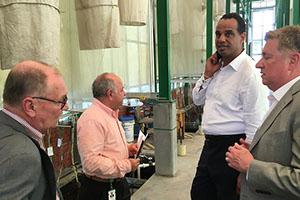The U.S. Grains Council (USGC) and its domestic partners, the U.S. Department of Agriculture’s (USDA’s) Foreign Agricultural Service (FAS), the Renewable Fuels Association (RFA) and Growth Energy, traveled to Colombia last week to cultivate relationships with the local ethanol industry and build support for increasing demand.
“In Colombia, we were able to hold face-to-face meetings with the local sugar and ethanol industries to discuss their current energy and ethanol situation and outlook,” said USGC Chief Economist Mike Dwyer, who traveled with the mission. “We had important conversations with these stakeholders about how ethanol imports can play a constructive role in ensuring local fuel can be blended consistently when domestic availabilities are inadequate.”
Colombia has five active ethanol plants, with another scheduled to be operational by the end of the year. However, its sugarcane-based industry is unable to supply the country with enough ethanol to reliably meet its current E8 blending mandate, let alone the higher blends the country aspires to. Tests performed in Colombia show their automobiles can run on E15 and higher blends.
To fill its deficit between domestic supply and demand, Colombia imports some ethanol, but those imports are erratic because the country has altered its mandates annually to largely accommodate local production.
In the past, Colombia has purchased some of its ethanol from the United States when it was cost competitive, as it is now. But since 2014, barely any U.S. ethanol has been shipped to Colombia despite the fact that U.S. fuel ethanol is the lowest priced, and highest quality, ethanol available for export globally.
To improve the relationship between the Colombian and U.S. ethanol industries, the group from the United States met with representatives from various Colombian ministries and the office of the president, the Colombian Biofuels Federation, Asocaña (representing the Colombian sugar industry) and Cenicaña (the sugar industry’s research arm). The group also toured one of the country’s ethanol plants.
“During our meetings, we really focused on developing a plan to promote higher mandates for ethanol use in Colombia,” Dwyer said. “We want to work with their industry to show them how U.S. ethanol imports can assist them with developing their market while they expand their production capacity. If local supplies are inadequate, the United States has the capacity to provide consumers in Colombia with competitively-priced U.S. ethanol.”
Like with other parts of the industry’s ethanol promotion strategy, the recent work in Colombia touched on demand building, policy and trade issues.
“While Colombia does not represent a very large market for fuel, it is an important one for the expansion of biofuel use globally. As the leader in world ethanol production and use, the U.S. industry plays an important role in promoting the benefits of biofuel as a gasoline additive and alternative fuel,” said Ed Hubbard, RFA general counsel.
“We want to share with the Colombians the importance of a strong biofuel policy that not only recognizes the full benefits of ethanol, but also the important role that international trade plays in the development of Colombia’s own domestic biofuel industry.”
This mission is just one of many programs the Council and its partners have planned this year to promote U.S. ethanol abroad, with efforts also focused on markets including Mexico, Japan, India and China.
“Part of our ongoing effort is to work with our trade partners to expand the market for ethanol worldwide,” said Jim Miller, vice president and chief economist at Growth Energy.
“Colombia is a significant ally of the United States and has made substantial progress in moving forward with cleaner burning fuels like ethanol. We look forward to continuing to work with them to improve domestic opportunities, as well as international opportunities for ethanol producers.”
Click here to learn more about the work that has been done to promote U.S. ethanol around the world



